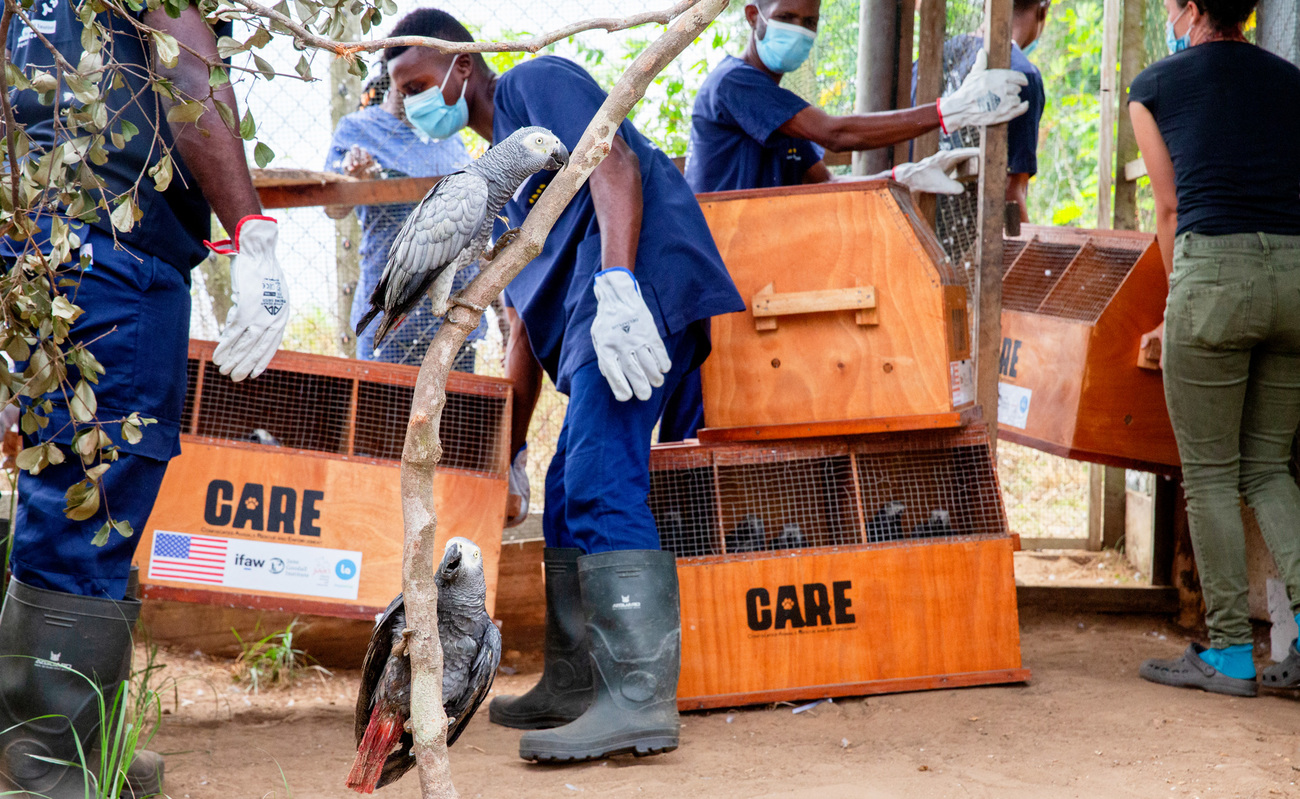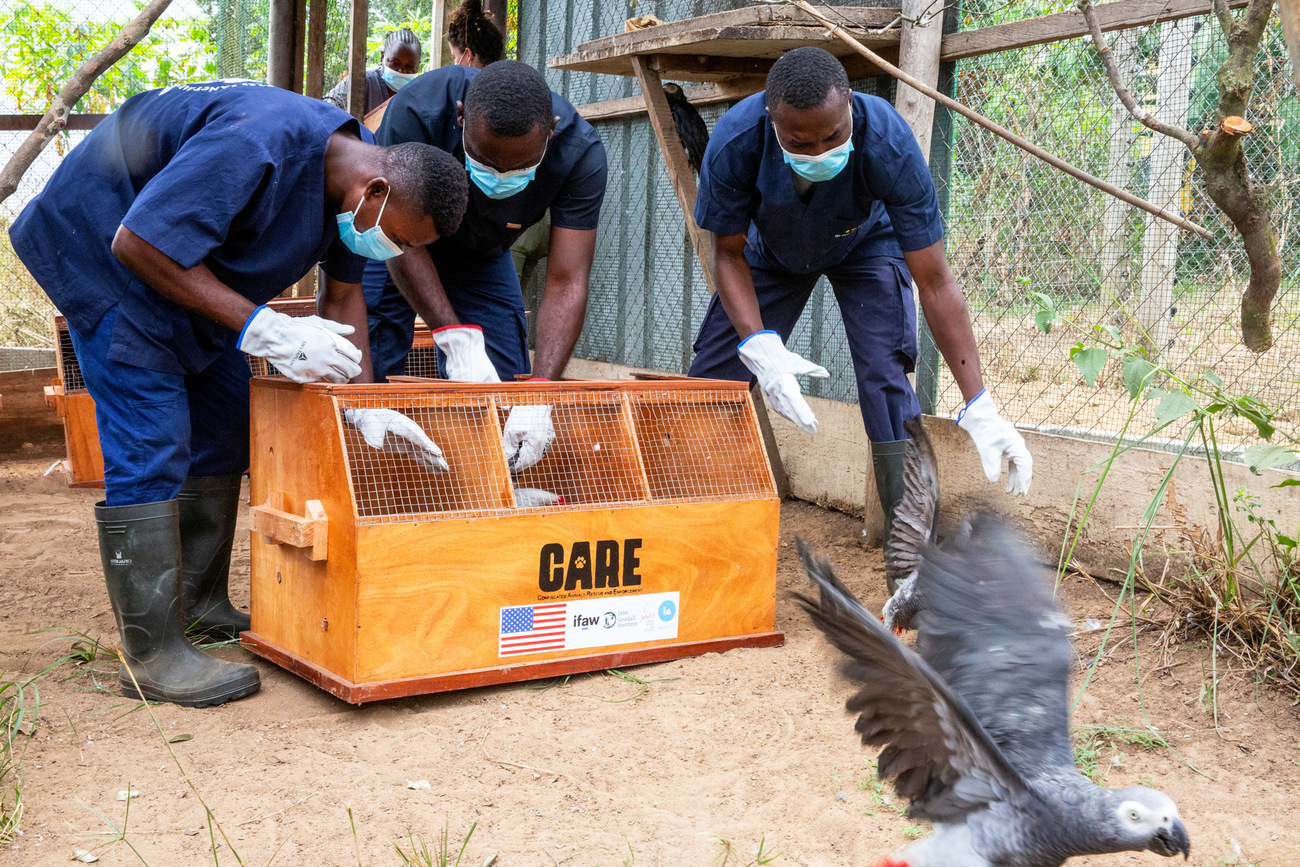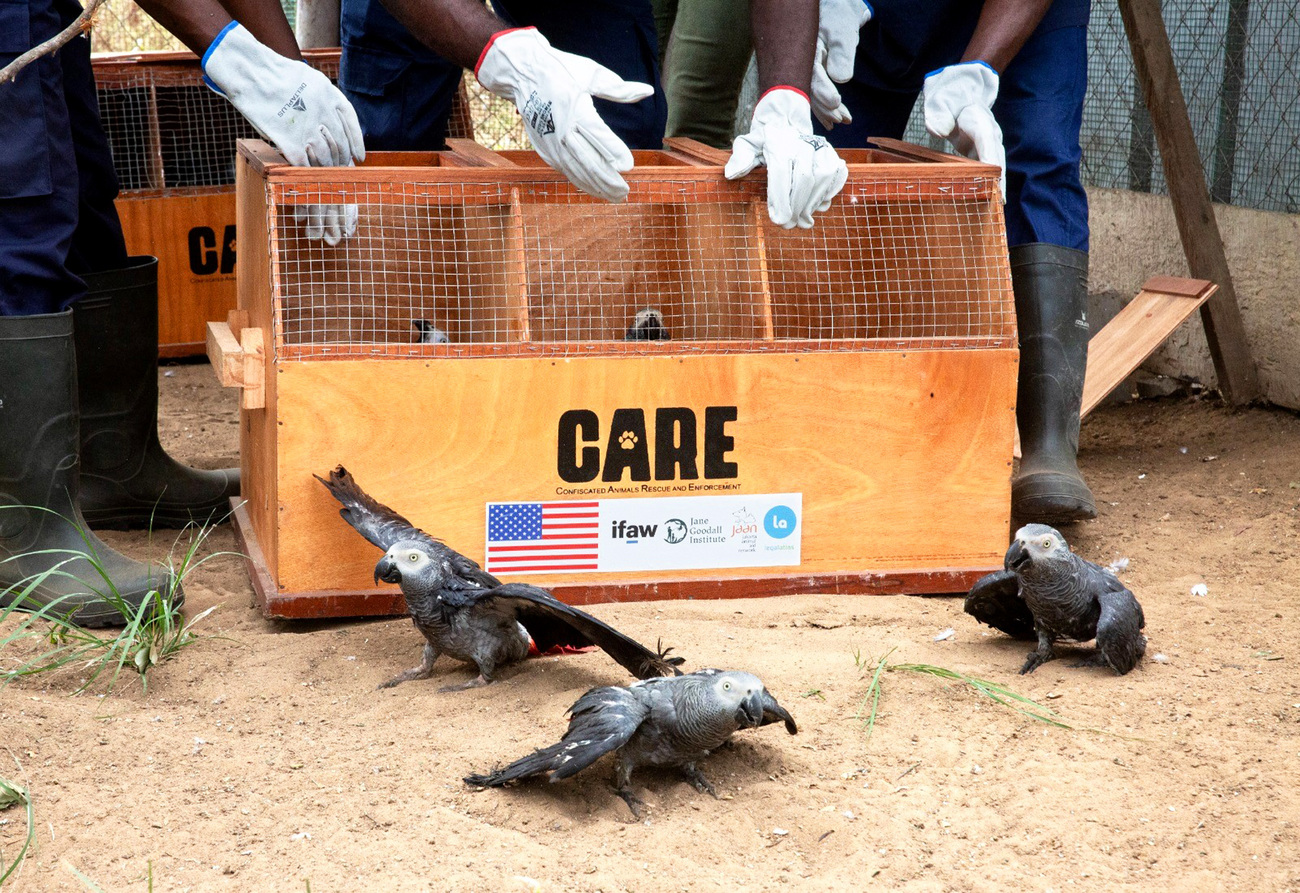CARE – Brazil, Guyana, Congo, and Uganda
Empowering frontline officers to rescue animals from wildlife traffickingSaving Africa's grey parrots from the illegal wildlife trade
Saving Africa's grey parrots from the illegal wildlife trade
Widely regarded as one of the most intelligent birds in the world, African grey parrots (Psittacus erithacus) are iconic representatives of the Congo Basin. Renowned for their remarkable ability to mimic human speech and sounds, they are also among the world’s most sought-after species in the exotic pet trade. This demand, coupled with habitat destruction and hunting, has pushed the African grey parrot to the brink of extinction.

Over 1.3 million grey parrots were captured and entered international trade between 1982 and 2001. Today, despite their uplisting to Appendix I under the Convention on International Trade in Endangered Species (CITES) in 2016, which affords the highest level of protection, illegal trade continues to decimate their population. Tragically, it is estimated that up to 66% of captured grey parrots die before even entering the trade pipeline—so the numbers we see in trade don’t come close to representing all the birds impacted.
A crisis in the Congo Basin
Nowhere is the crisis more evident than in the Democratic Republic of Congo (DRC), home to over half the species’ global range. Here, unsustainable trade practices and corruption fuel a relentless market for grey parrots. Major transit points such as Kinshasa’s and Kisangani’s airports see hundreds of parrots shipped monthly, often in horrific conditions. These birds are destined for markets worldwide, where they are sold as exotic pets or exploited for their feathers and bushmeat.
IFAW, in collaboration with partners like the World Parrot Trust, Lukuru Foundation, and Congolese experts Dr. Terese Hart and Dr. John Hart, has been at the forefront of combatting this crisis. We’ve sponsored investigations and arrests of smugglers, while also supporting the rescue and rehabilitation of 453 parrots—401 African greys and 52 red-fronted parrots—from August 2022 to December 2023.
In June 2023, a sting operation under IFAW’s Confiscated Animals – Rescue and Enforcement (CARE) project saved 45 grey parrots from illegal trade in Pointe-Noire, Republic of the Congo. IFAW’s partners at the Jane Goodall Institute (JGI) provided support in the handling and transport of these parrots—moving them out of overcrowded wicker baskets and into safe, bird-specific transport cages. At JGI’s Tchimpounga Chimpanzee Rehabilitation Center, they received the care and treatment they so desperately needed—and, most importantly, they were free to spread their wings.

In 2022, a major confiscation occurred in Uganda, when reports of a suspected trafficker led to investigations by the Uganda Wildlife Authority, Conserv Congo, and World Parrot Trust, with support from the Wildlife Trust of India and IFAW. This individual was arrested for smuggling 122 grey parrots to Uganda from the DRC. Three parrots had already died due to the traumatic and dangerous conditions they experienced. The other 119 were brought to Uganda Wildlife Conservation Education Centre for rehabilitation. The birds that made a full recovery were released back to the wild in Kibale National Park.
A fight for legal protections
What made these arrests and confiscations possible is the law that makes trafficking grey parrots illegal. Grey parrots are protected under CITES, the international agreement that dictates which animals can be legally traded around the world. Thanks to the advocacy efforts of IFAW and other conservationists, in 2016, grey parrots were uplisted to CITES Appendix I, which effectively bans all trade in the species.
On 31 July 2025, grey parrots finally received full legal protection in the DRC. This landmark ruling now means that it will be a criminal offense to capture, possess, kill, sell, and transport the species. It’s a step forward to ensure implementation and enforcement of the CITES decisions and recommendations for this species.
‘This legislation sends a clear signal to wildlife traffickers that trading these parrots will not be tolerated—whether done online or in person,’ says Christian Plowman, IFAW Wildlife Cybercrime Program Manager. ‘While this is a positive step, we know that traffickers are becoming increasingly sophisticated and finding new ways to conceal their activities. This is something we are already seeing through our wildlife cybercrime work, so we must remain vigilant.’
This change in their legal status is a cause for celebration—but also reflects the dire situation grey parrots are facing, exposing just how serious the threat of trapping and taking these birds from the wild has become.
Now that grey parrots have been given these legal protections, it has also fallen on our shoulders to make sure this law is enforced. That’s why IFAW dedicates time and resources towards training law enforcement officials in the proper identification and safe handling of live wild animals seized in trade.
Under CARE, funded by the US Bureau of International Narcotics and Law Enforcement Affairs (INL), IFAW has also trained 80+ frontline officers in animal handling, including the safe and humane handling of African grey parrots; helped distribute equipment to key interception locations and agencies so they have the necessary tools (including customised cages) to handle grey parrots; and shared species-specific guidelines for their care.

Each bird saved is a step toward preserving the species as a whole. In Maniema province, where the parrot trade is rampant, confiscations have also helped us identify vulnerable parrot populations and establish collaborative monitoring networks. By addressing these localised issues, we are creating a model for other provinces—and ultimately for the entire region—to follow.
Related content
Blog
Building frontline capacity to fight wildlife trafficking in Liberia
Read moreBlog
Training, tools, and trust: how the CARE project is transforming wildlife enforcement around the globe
Read morePress releases
Innovative online courses available for law enforcement officers handling seized wildlife
Read moreEvery problem has a solution, every solution needs support.
The problems we face are urgent, complicated and resistant to change. Real solutions demand creativity, hard work and involvement from people like you.